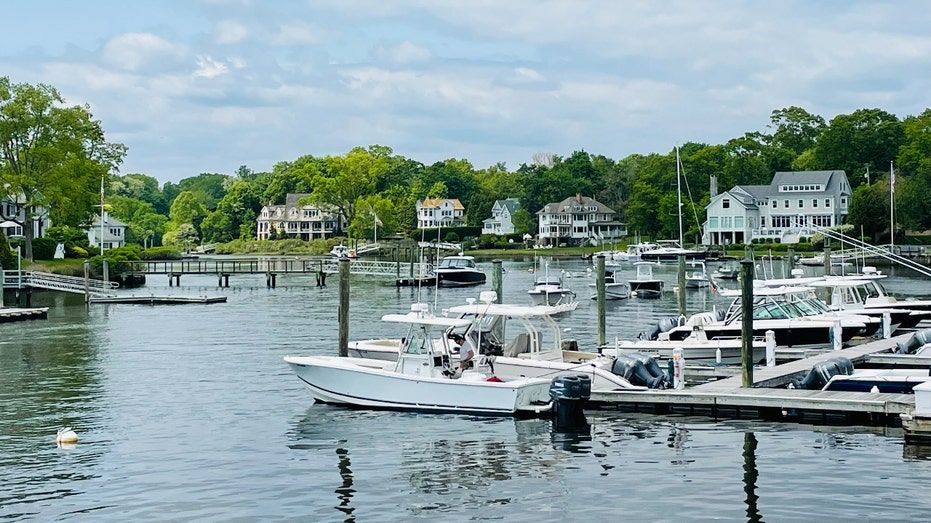
Speaking to a classroom of students at his alma mater, Boston University’s School of Theology, Martin Mugerwa described how being a chaplain informs his work as a counselor at a mental-health clinic, where he treats people navigating depression, unemployment, and homelessness. But the campus was whirring with talk of the Trump administration’s immigration crackdown, and several international students stayed after class that February evening to ask whether Mugerwa—who is from Uganda—feared that he could be targeted. “I’m not worried,” Mugerwa told them confidently. “He’s going after criminals.” Mugerwa told me that his outlook on the new presidency, and how it could alter his own fate, changed the next day. His family and a group of friends stopped to see Niagara Falls on their way to visit one of Mugerwa’s seminary classmates. But they took a wrong turn and ended up on a bridge that led across the Canadian border. When they told an American customs officer that they wanted to turn around and remain in the United States, they were directed instead to an immigration office. Hours later, an official explained that Mugerwa and two others in the group were going to be detained for overstaying their visas, even though they had all applied for asylum and were still waiting for their cases to be decided. Mugerwa turned to his partner and sons, who are 5 years old and 10 months old. “I was like, What is going to happen at this point? How is she going to manage?” he recalled thinking. “Who is going to pay the mortgage? My mind was just spinning.” Five days later, he was in shackles, being booked into a federal detention center in Texas and certain that he would soon be deported. Throughout his campaign and since taking office, President Donald Trump has promised that the “mass deportation” effort carried out at his direction would focus on unauthorized immigrants with serious criminal records—an idea that most Americans continue to view favorably. The administration has at times argued that because unlawful presence is a civil violation, any deportation is in keeping with the president’s prior statements. But many Trump supporters, including undocumented immigrants themselves, took to heart his repeated assurances that the administration would put the emphasis squarely on people who clearly threatened public safety. That hasn’t happened. In the face of immense pressure to hit the president’s stated goals for arrests and deportations, Immigration and Customs Enforcement officials are arresting people who, polling suggests, most Americans believe should be left alone, if not offered a pathway to legal residency after completing an application process. Like Mugerwa, many of them have American-born children, no criminal record, and a documented history of paying taxes and contributing to society through their churches and volunteer work. “They’re sort of like the perfect noncitizen,” Mugerwa’s lawyer, Christina Corbacci, told me. “In no other time would you see them get picked up.” In fact, deportations of people with limited or no criminal record increased during Barack Obama’s first term, and frustrated progressives labeled him the deporter in chief. The public outcry that followed led to efforts by members of Congress to protect various categories of immigrants—including essential workers, the parents of Deferred Action for Childhood Arrivals recipients, and longtime U.S. residents. Nearly all of those efforts have failed. But the Obama and Biden administrations used other tools to achieve similar ends, directing ICE to avoid arresting such people and closing their deportation cases. During his first term, Trump limited the use of those programs, and he appears close to eliminating them now. The deportation push is likely to intensify. Trump promised the largest campaign in history, but ICE has struggled to deliver the numbers he wants. Homeland Security Secretary Kristi Noem recently announced that all immigrants without legal status must register with the government or face criminal consequences, which could make it easier for ICE to locate people who have had no other interactions with law enforcement. “When I was an officer, you had discretion, and if someone made a reasonable request to stay and was following the rules, I would usually grant it,” Jim Rielly, who spent 23 years as an officer for ICE and its predecessor, Immigration and Naturalization Services, told me. “Now it seems like it’s being dictated that anyone is fair game.” ICE did not respond to a request for comment for this story. Trump’s border czar, Tom Homan, has offered mixed messages, telling journalists in one interview that ICE would determine how to address noncriminal immigrants “on a case-by-case basis” but saying in another, “We’re not going to tell ICE to ignore the oath that they took to enforce immigration law and walk away from the illegal alien.” Some of the president’s most influential supporters, including Joe Rogan and Ann Coulter, have criticized the arrests of some noncriminal immigrants. Rogan called the deportation of a Venezuelan makeup artist to a prison in El Salvador for his alleged membership in a gang—for which the administration has presented only dubious proof—“horrific.” Israel Rose, a Republican immigration lawyer who voted for Trump, told me he has been troubled by the cases he’s seen ICE pursue. Rose, who specializes in representing people from former Soviet-bloc countries, is involved in the cases of two Moldovan men who have been detained since February. They have no criminal records and American-born children as young as 2 years old. “They both are successful businessmen who pay taxes every year. It’s a shame,” Rose said. He said the cases, and others that he is working on, have tempered his support for the president: “I love that he’s picking up violent criminals in the streets—we shouldn’t have that. But then you have cases like this where it’s like, ‘What are you doing?’ It’s very harsh.” Rose said that although he opposes the pro-Palestinian protest movement at Columbia University that triggered the arrest of student activist Mahmoud Khalil, “even he should have his day to present his side of the story. That’s how this country works.” Considering that case, in which the administration initially sought to block Khalil from defending himself in court, and Trump’s refusal to return planes full of people deported to El Salvador in defiance of a judicial order, Rose said the president is acting “like he’s above the law at this point.” Wilman Hernandez has lived in the United States for 22 years; owns a construction company in Manassas, Virginia; and, aside from two minor traffic violations, has a clean record. He was so certain that he was safe in the United States, despite lacking any legal immigration status, that he tried to move out of the way when he saw an ICE vehicle driving toward him early one morning in March while he was on his way to pick up an employee for work. Instead, officers jumped out of their car with guns drawn and began shouting orders at him. “I never thought it would be possible,” Hernandez told me. Trump “said he would arrest people who’d done bad things.” After his arrest, he was detained for a month. Hernandez said his 6-year-old daughter has been in therapy since his arrest, after which she developed insomnia and started crying throughout the school day. His wife, who is also undocumented, refused to leave the house for weeks, even to buy groceries, for fear of being arrested too. To get Hernandez released from detention on a bond so that he could continue to work while he fights his deportation case, his lawyer secured letters of support from clients, former employers, and members of Hernandez’s church, as well as tithing records showing that he has donated more than $116,000 since 2008. He told me that while he was detained, he lost several jobs that he’d lined up, and some of his employees had to move on to work for other businesses. “All this month I’ve been trying to start over from zero,” he said. The current crackdown has extended to other groups ICE previously considered low priorities for deportations, such as green-card holders with criminal records from years or even decades ago. That’s how Lewelyn Dixon, a lab technician at the University of Washington, ended up being detained in March on her way back from a trip to the Philippines, where she was born. Dixon came to the United States with a green card as a teenager more than 50 years ago. She is among the only people in her family who chose not to pursue naturalization, because, she told me, her father’s dying wish was that she retain her Filipino citizenship in order to inherit land that the family owns there. This never seemed to present a problem, even after the sole encounter she had with law enforcement, 24 years ago. Dixon says that while she was working at a bank, a co-worker persuaded her to play a role in stealing $6,000. Dixon was convicted but never went to jail. She was sentenced to one month lived in a halfway house and wore an ankle monitor for a year. The conviction didn’t negate her eligibility for U.S. citizenship, but it did make her deportable—a legal limbo that is ensnaring others like her. “We’re all freaking out,” one of Dixon’s nieces, Lani Madriaga, told me. “It’s like double jeopardy—she’s getting retried again on something that she did years ago.” Because of the nature of the crime she committed, Dixon is subject to mandatory detention, making her part of a category that Congress voted in January to expand under the Laken Riley Act. “This is just so frustrating,” Dixon told me in a call from a Washington State detention center, where she said she is trying to keep her spirits up and encourage the other women around her, who, unlike her, can’t afford to hire a lawyer. “I don’t understand why they hold us here for this long.” Dixon will remain in ICE custody at least until her next hearing, in July. If she is deported, she will lose the right to collect Social Security less than a year shy of her 65th birthday, after working in the United States her entire adult life. Weeks into Mugerwa’s detention, his family raised $15,000 in donations to pay for his lawyer and a bond so he could be released. Despite his pending asylum claim, he remains in deportation proceedings; he will have to go before a judge to plead for a chance to stay in the United States. But people with prior deportation orders—including those without any criminal record—won’t have that opportunity. Abel Orozco Ortega, a mild-mannered 47-year-old grandfather and the owner of a successful tree-trimming business who has lived in the United States since he was 17, was picked up at his home outside Chicago after Trump’s inauguration in January. In the past, he would have been a prime candidate for the programs that allowed some unauthorized immigrants to remain in the country because of their long-standing ties here and contributions to society. But because those programs have largely been eliminated, a judge will never hear the details of his life. A deportation officer told his lawyer that he’ll likely soon be sent back to Mexico.















